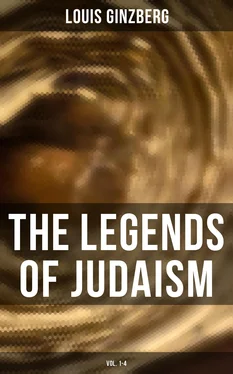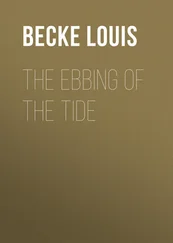Louis Ginzberg - The Legends of Judaism (Vol. 1-4)
Здесь есть возможность читать онлайн «Louis Ginzberg - The Legends of Judaism (Vol. 1-4)» — ознакомительный отрывок электронной книги совершенно бесплатно, а после прочтения отрывка купить полную версию. В некоторых случаях можно слушать аудио, скачать через торрент в формате fb2 и присутствует краткое содержание. Жанр: unrecognised, на английском языке. Описание произведения, (предисловие) а так же отзывы посетителей доступны на портале библиотеки ЛибКат.
- Название:The Legends of Judaism (Vol. 1-4)
- Автор:
- Жанр:
- Год:неизвестен
- ISBN:нет данных
- Рейтинг книги:5 / 5. Голосов: 1
-
Избранное:Добавить в избранное
- Отзывы:
-
Ваша оценка:
- 100
- 1
- 2
- 3
- 4
- 5
The Legends of Judaism (Vol. 1-4): краткое содержание, описание и аннотация
Предлагаем к чтению аннотацию, описание, краткое содержание или предисловие (зависит от того, что написал сам автор книги «The Legends of Judaism (Vol. 1-4)»). Если вы не нашли необходимую информацию о книге — напишите в комментариях, мы постараемся отыскать её.
The Legends of Judaism (Vol. 1-4) — читать онлайн ознакомительный отрывок
Ниже представлен текст книги, разбитый по страницам. Система сохранения места последней прочитанной страницы, позволяет с удобством читать онлайн бесплатно книгу «The Legends of Judaism (Vol. 1-4)», без необходимости каждый раз заново искать на чём Вы остановились. Поставьте закладку, и сможете в любой момент перейти на страницу, на которой закончили чтение.
Интервал:
Закладка:
THE FOURTH DAY
The fourth day of creation produced the sun, the moon, and the stars. These heavenly spheres were not actually fashioned on this day; they were created on the first day, and merely were assigned their places in the heavens on the fourth. At first the sun and the moon enjoyed equal powers and prerogatives. The moon spoke to God, and said: "O Lord, why didst Thou create the world with the letter Bet?" God replied: "That it might be made known unto My creatures that there are two worlds." The moon: "O Lord: which of the two worlds is the larger, this world or the world to come?" God: "The world to come is the larger." The moon: "O Lord, Thou didst create two worlds, a greater and a lesser world; Thou didst create the heaven and the earth, the heaven exceeding the earth; Thou didst create fire and water, the water stronger than the fire, because it can quench the fire; and now Thou hast created the sun and the moon, and it is becoming that one of them should be greater than the other." Then spake God to the moon: "I know well, thou wouldst have me make Thee greater than the sun. As a punishment I decree that thou mayest keep but one-sixtieth of thy light." The moon made supplication: "Shall I be punished so severely for having spoken a single word?" God relented: "In the future world I will restore thy light, so that thy light may again be as the light of the sun." The moon was not yet satisfied. "O Lord," she said, "and the light of the sun, how great will it be in that day?" Then the wrath of God was once more enkindled: "What, thou still plottest against the sun? As thou livest, in the world to come his light shall be sevenfold the light he now sheds." The Sun runs his course like a bridegroom. He sits upon a throne with a garland on his head. Ninety-six angels accompany him on his daily journey, in relays of eight every hour, two to the left of him, and two to the right, two before Him, and two behind. Strong as he is, he could complete his course from south to north in a single instant, but three hundred and sixty-five angels restrain him by means of as many grappling-irons. Every day one looses his hold, and the sun must thus spend three hundred and sixty-five days on his course. The progress of the sun in his circuit is an uninterrupted song of praise to God. And this song alone makes his motion possible. Therefore, when Joshua wanted to bid the sun stand still, he had to command him to be silent. His song of praise hushed, the sun stood still.
The sun is double-faced; one face, of fire, is directed toward the earth, and one of hail, toward heaven, to cool off the prodigious heat that streams from the other face, else the earth would catch afire. In winter the sun turns his fiery face upward, and thus the cold is produced. When the sun descends in the west in the evening, he dips down into the ocean and takes a bath, his fire is extinguished, and therefore he dispenses neither light nor warmth during the night. But as soon as he reaches the east in the morning, he laves himself in a stream of flame, which imparts warmth and light to him, and these he sheds over the earth. In the same way the moon and the stars take a bath in a stream of hail before they enter upon their service for the night.
When the sun and the moon are ready to start upon their round of duties, they appear before God, and beseech him to relieve them of their task, so that they may be spared the sight of sinning mankind. Only upon compulsion they proceed with their daily course. Coming from the presence of God, they are blinded by the radiance in the heavens, and they cannot find their way. God, therefore, shoots off arrows, by the glittering light of which they are guided. It is on account of the sinfulness of man, which the sun is forced to contemplate on his rounds, that he grows weaker as the time of his going down approaches, for sins have a defiling and enfeebling effect, and he drops from the horizon as a sphere of blood, for blood is the sign of corruption. As the sun sets forth on his course in the morning, his wings touch the leaves on the trees of Paradise, and their vibration is communicated to the angels and the holy Hayyot, to the other plants, and also to the trees and plants on earth, and to all the beings on earth and in heaven. It is the signal for them all to cast their eyes upward. As soon as they see the Ineffable Name, which is engraved in the sun, they raise their voices in songs of praise to God. At the same moment a heavenly voice is heard to say, "Woe to the sons of men that consider not the honor of God like unto these creatures whose voices now rise aloft in adoration." These words, naturally, are not heard by men; as little as they perceive the grating of the sun against the wheel to which all the celestial bodies are attached, although the noise it makes is extraordinarily loud. This friction of the sun and the wheel produces the motes dancing about in the sunbeams. They are the carriers of healing to the sick, the only health-giving creations of the fourth day, on the whole an unfortunate day, especially for children, afflicting them with disease. When God punished the envious moon by diminishing her light and splendor, so that she ceased to be the equal of the sun as she had been originally, she fell, and tiny threads were loosed from her body. These are the stars.
THE FIFTH DAY
On the fifth day of creation God took fire and water, and out of these two elements He made the fishes of the sea. The animals in the water are much more numerous than those on land. For every species on land, excepting only the weasel, there is a corresponding species in the water, and, besides, there are many found only in the water.
The ruler over the sea-animals is leviathan. With all the other fishes he was made on the fifth day. Originally he was created male and female like all the other animals. But when it appeared that a pair of these monsters might annihilate the whole earth with their united strength, God killed the female. So enormous is leviathan that to quench his thirst he needs all the water that flows from the Jordan into the sea. His food consists of the fish which go between his jaws of their own accord. When he is hungry, a hot breath blows from his nostrils, and it makes the waters of the great sea seething hot. Formidable though behemot, the other monster, is, he feels insecure until he is certain that leviathan has satisfied his thirst. The only thing that can keep him in check is the stickleback, a little fish which was created for the purpose, and of which he stands in great awe. But leviathan is more than merely large and strong; he is wonderfully made besides. His fins radiate brilliant light, the very sun is obscured by it, and also his eyes shed such splendor that frequently the sea is illuminated suddenly by it. No wonder that this marvellous beast is the plaything of God, in whom He takes His pastime.
There is but one thing that makes leviathan repulsive, his foul smell: which is so strong that if it penetrated thither, it would render Paradise itself an impossible abode.
The real purpose of leviathan is to be served up as a dainty to the pious in the world to come. The female was put into brine as soon as she was killed, to be preserved against the time when her flesh will be needed. The male is destined to offer a delectable sight to all beholders before he is consumed. When his last hour arrives, God will summon the angels to enter into combat with the monster. But no sooner will leviathan cast his glance at them than they will flee in fear and dismay from the field of battle. They will return to the charge with swords, but in vain, for his scales can turn back steel like straw. They will be equally unsuccessful when they attempt to kill him by throwing darts and slinging stones; such missiles will rebound without leaving the least impression on his body. Disheartened, the angels will give up the combat, and God will command leviathan and behemot to enter into a duel with each other. The issue will be that both will drop dead, behemot slaughtered by a blow of leviathan's fins, and leviathan killed by a lash of behemot's tail. From the skin of leviathan God will construct tents to shelter companies of the pious while they enjoy the dishes made of his flesh. The amount assigned to each of the pious will be in proportion to his deserts, and none will envy or begrudge the other his better share. What is left of leviathan's skin will be stretched out over Jerusalem as a canopy, and the light streaming from it will illumine the whole world, and what is left of his flesh after the pious have appeased their appetite, will be distributed among the rest of men, to carry on traffic therewith.
Читать дальшеИнтервал:
Закладка:
Похожие книги на «The Legends of Judaism (Vol. 1-4)»
Представляем Вашему вниманию похожие книги на «The Legends of Judaism (Vol. 1-4)» списком для выбора. Мы отобрали схожую по названию и смыслу литературу в надежде предоставить читателям больше вариантов отыскать новые, интересные, ещё непрочитанные произведения.
Обсуждение, отзывы о книге «The Legends of Judaism (Vol. 1-4)» и просто собственные мнения читателей. Оставьте ваши комментарии, напишите, что Вы думаете о произведении, его смысле или главных героях. Укажите что конкретно понравилось, а что нет, и почему Вы так считаете.












